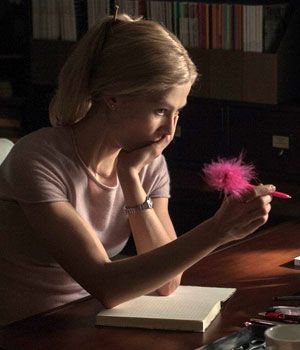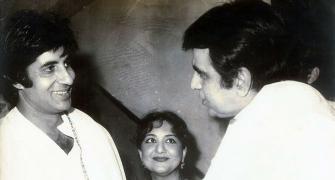 Gone Girl is a finely-made frustration, often too polished for its own good, says Raja Sen.
Gone Girl is a finely-made frustration, often too polished for its own good, says Raja Sen.
One of the few things more inscrutable than the mind of a woman -- more complex, harder to unspool, if you will -- is the collective mind of a couple.
Not just the joint decision-making, shaped via pragmatism and compromise and societal positioning, but their decisions re: each other.
What makes them fight all the time? Does he really like her? How bizarre for those two to have a spark… No matter what, we the observers remain perpetually outside the fishbowl while they grow to think as one, however perfect or discordant.
We can pretend we’re in on the joke, but they're the only ones who get every layer.
This appears evident in the freshly-forged collaboration between director David Fincher and author Gillian Flynn, who, with Gone Girl, have taken her characters and his characteristic style and run with it, staying loyal to her riveting novel but, well, true to his cunning methods, loyal like a fox.
His form and her content play off each other with obvious glee, but this mutual admiration dulls the edge off both text and technique.
The two of them might have a blast, but those of us mortals closed off from the fishbowl might find this adaptation a little less satisfying -- and a little too convenient.
It becomes gapingly aware that Gone Girl is not a novel (and that it perhaps wants desperately to be one) when we see the first chapter title next to Ben Affleck's Nick.
"The Day Of" works in the novel, but on screen the words dangle in the air, as if waiting for some specific: The Murder/The Disappearance/The Jackal. They aren't, and Nick is as unfinished as the phrase.
He goes to a bar, greets his sister, starts playing the Life board-game over a morning glug of Bourbon.
The dialogue, however, true to the book, jars. In Fincher's expert hands, it all initially rings too hollow, too expository. Till you get used to it, which takes a little while.
And then we hear her.
Amy Elliot Dunne, Nick's wife, unwilling muse for children's books that dub her Amazing, and a woman with a voice so cartoonishly fluffy it could launch a million Elizabeth Gilbert audiobooks. Like in the book, she has her own side of the story, and it is a warm, romcom-my one, full of sugardust and cutesy marriage proposals.
This is not the story Nick is in right now; it is the morning of their fifth wedding anniversary and Amy is missing.
The world mostly suspects Nick, not least because he doesn't look as worried as they feel he should, and because he has the smuggest grin in the world.
It is this grin that makes Affleck such an ideal choice for the part.
Nick is a broad-shouldered Missouri boy, a cornfed Homecoming King type whose mother raised him to be polite to casserole-carrying strangers even when his world is collapsing around him.
When at a press conference talking about his missing wife, he stands awkwardly next to a large picture of her -- a perfect picture, professionally shot and lit, just the way Amy would like -- one of the photographers inappropriately asks him to smile.
Slumped shoulders notwithstanding, he obliges wryly for a split-second, more a muscle-reflex than an actual smile, but even this one frame is enough for the press and for us.
It is a winner's smile, a grin so entitled it dazzles the rest of us into inadequacy.
The he-said/she-said narrative style of the book was always going to be a challenge, and Fincher gets it half-right.
Amy, played by Rosamund Pike, initially effervescent and later icy as a sucked-on lozenge, is a methodical diarist.
A method diarist, even, going by the way she tops her pens and pencils with thematically aproppriate props -- a stork, a wedding-cake couple -- while writing out entries in voices first besotted then beleaguered.
Nick, on the other hand, never quite gets a say: we follow him stumbling ineptly through the proceedings, looking as guilty as someone who forgot to take out the trash but not someone who killed his wife.
Is there a difference, though?
Fincher thinks there is, and leaves it to his master composers Trent Reznor and Atticus Ross to underscore things, and this they do with magnificent ease.
The background score is equal parts serrated (for Nick) and silken (for Amy) in the first half of the film, the he-said/she-said portion, and were the score less masterful -- layering simple groove upon less-simple groove in spirals, creating a repetitive and most meticulous disharmony -- one might well ask if there is too much music in this film.
As it stands, though, the music is the best thing about Gone Girl.
As a investigative procedural, Fincher (who also made Zodiac and Se7en) has us more than covered.
Kim Dickens, looking like a flintier version of Amy Adams, plays detective Rhonda Boney with an easy efficiency that wouldn't be out of place in a Coen film.
Tyler Perry is perfect as the narcissistic lawyer who specialises in defending the indefensible, talking the talk, calling himself Elvis and hurling gummybears with admirable precision.
Carrie Coon, as Nick's wary twin sister Margo, is scene-stealingly good.
But for all the players who shine, twice as many get the short end of the stick.
Sela Ward doesn't get to snap her talkshow-host fangs nearly as much, David Clennon and Lisa Banes don't get their due as Amy's parents (though Banes is great in one cutting bit of dailogue), Neil Patrick Harris is fine as Desi Collings but the character is far too inadequate minus the terrific, terrifying mother character the book has but the film doesn't.
Also, casting an actress instead of Emily Ratajkowski might have allowed the Andie character a bit more room. The investigation works but the media circus -- and the townsfolk taking selfies outside Nick's bar -- needed to be focussed on more sharply.
The reason, one surmises, that so much was excised has less to do with length and more to do with making Gone Girl about the titular girl.
Much of the film is obsessed with Amy, and while Rosamund Pike throws herself gamely into the part -- in particular, she snaps a Kit-Kat loud as a pro and says the word "idiot" wonderfully well -- this serves to only make us like her less.
It's topnotch craftsmanship, but to what end?
There is a sensational scene with Amy and a hammer, and while it made me jump both times I saw it, and continues to haunt me, it doesn't entirely make sense.
But then Sense, at least the big-picture version of the word, has never been Fincher's end-game, has it?
Gone Girl is a finely-made frustration, often too polished for its own good.
It's almost as exasperating as trying to write the review for a mystery without giving anything away.
For those who have read the book, all you really need to know is that Fincher criminally sucks the life out of the 'Cool Girl' monologue.
For the rest, this is a solid mystery film that falls short of greatness.
In a nutshell, to quote Nick's magazine-writerly complaint about Amy's diary, it rests on too convenient an endnote.
Rediff Rating: 









